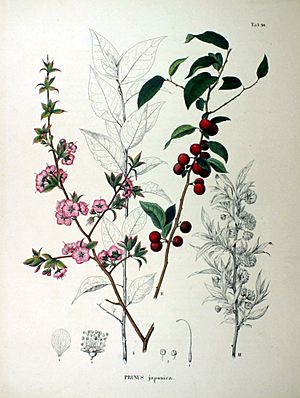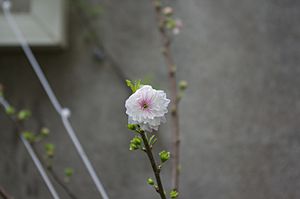Prunus japonica facts for kids
Quick facts for kids Prunus japonica |
|
|---|---|
 |
|
| Prunus japonica | |
| Scientific classification | |
| Kingdom: | |
| (unranked): | |
| (unranked): | |
| (unranked): | |
| Order: | |
| Family: | |
| Genus: | |
| Subgenus: | |
| Species: |
P. japonica
|
| Binomial name | |
| Prunus japonica |
|
| Synonyms | |
|
|
Prunus japonica, often called the Korean cherry, is a lovely shrub. It is also known as the Flowering almond or Oriental bush cherry. This plant belongs to the Prunus group, which includes many familiar fruits like cherries and plums. People often grow it because its flowers are very pretty. You can find this plant growing naturally from Central China to the Korean peninsula.
Contents
About the Korean Cherry
What it Looks Like
The Korean cherry shrub can grow up to 1.5 meters (about 5 feet) tall and just as wide. Its flowers have both male and female parts, which means they can produce seeds. Tiny insects help these flowers get pollinated. The plant usually blooms in May, showing off its beautiful flowers.
Fruit and Seeds
After the flowers, small fruits grow. Each fruit is about 14 millimeters (about half an inch) across. These fruits are safe to eat and are sometimes used to make pies. Inside each fruit, there is one seed. New Korean cherry plants usually grow from these seeds.
Other Uses for the Plant
Beyond its pretty looks and tasty fruit, the Korean cherry has other uses. The leaves of this plant can be used to make a green dye. The fruit can also be used to create a dye that ranges from greenish to grayish in color.
Different Kinds of Korean Cherry
There are a few different types, or varieties, of Prunus japonica. These varieties might have slight differences in their size or fruit. Some of the known varieties include:
- P. japonica eujaponica
- P. japonica gracillima
- P. kerii
- P. japonica nakaii: This special variety comes from a region called Manchuria. It is known for growing much bigger plums, which can be up to 50 millimeters (about 2 inches) wide!
Images for kids
 | Jessica Watkins |
 | Robert Henry Lawrence Jr. |
 | Mae Jemison |
 | Sian Proctor |
 | Guion Bluford |



